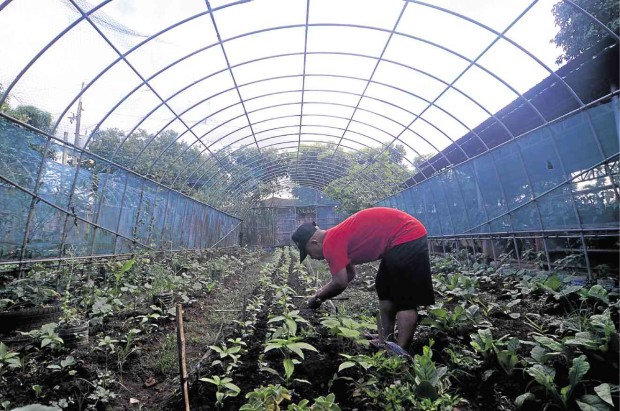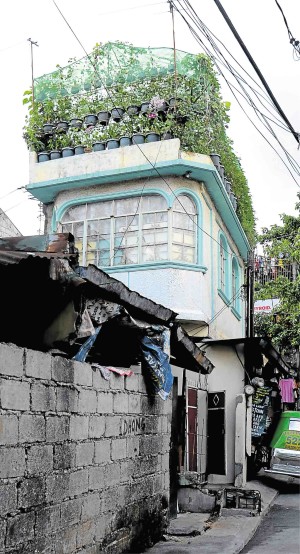Green thumbs up for this QC village
In the middle of the urban sprawl, these Quezon City residents have gotten their hands dirty and their thumbs green.
In Barangay Holy Spirit, despite the limited space, gardening as a sustained community effort has taken root, producing a cornucopia of vegetables and fruits, while slowly breaking old mindsets.
In about 500 households, eggplant, okra, radish, alugbati (vine spinach), malunggay (moringga), ampalaya (bitter gourd) and saluyot (jute) are now growing in plots, pots, recycled pails and used tires. Previous harvests include lettuce, calamansi, and even grapes.
Now on its second year, the “Gulayan at Bulaklakan” project is a brainchild of barangay chair Felicito Valmocina, the longtime leader of the village.

A worker tends a plot at the agriculture research and training center in Barangay Holy Spirit, Quezon City.—PHOTOS BY ARNOLD ALMACEN
In an unconventional move, Valmocina required all 500 personnel of the barangay government to plant at least one vegetable crop at home. Soon enough, walls, rooftops, terraces and even sidewalks turned earthy and leafy, producing fresh ingredients that would later make it to the dinner table.
Twice a year, inspectors would visit the homes to check for compliance, which is crucial especially for contractual workers. “Every six months, before I sign their (contract) renewal papers, my inspectors would visit their place and take photos,” Valmocina said in an interview last week.
It may be an unusual requirement but it was actually more of a push for them to augment their meager salaries. Growing one’s own food can do wonders for the budget of a barangay employee who earns as low as P5,000 month, the local official said.
“My objective is to also help them stay healthy and live longer.”
A native of Bulacan province, Valmocina thought of growing the same fruits and veggies he loved in his hometown when moved to QC. In 1998, during his earlier stint as a barangay official and with still enough available space in Holy Spirit, he set up a small garden for the community.
Two decades later, that garden has expanded into a one-hectare research and training center for the Gulayan at Bulaklakan project, where around 15 varieties of vegetables are grown and studied. Manned by barangay employees who volunteer their time, the site is equipped with a composting facility and a solar-powered pump for irrigation.
Recently, the workers’ toil was rewarded with a yield of broccoli, cauliflower and strawberries.
“Residents can go to the center anytime to get seeds, soil and compost to start their own garden,” Valmocina said. Poor families living nearby are welcome to ask for a little share of the produce if they don’t have cash for their next ulam or viand.
The barangay allots P600,000 a year to run the center, which also provides free training for interested residents.
For Noel Abecendario, head of the barangay public safety office, cultivating his own greens has become a form of therapy. “At night, when I get home tired, I just water my plants and it’s already a stress reliever,” he said.
His harvests, he said, had cut in half his daily P300 budget for meals.
Alberto Serapion, another public safety officer who spends his free time at the center, had seen his walls grow heavy with ampalaya and eggplants. When the Inquirer saw him recently, he was busy planting pechay (Chinese cabbage) in between rows of radish.
Valmocina noted that while the residents’ harvest may be smaller compared to commercially grown crops, Holy Spirit’s fruits and veggies are organic and untouched by chemicals. “It tastes even better because you’ve worked for it,” he said.
“Right now, we only have a small part of the community producing their own food,” said the village chair who oversees a population of around 150,000. “If we can get at least 60 percent involved, then maybe we can start our own (farmers’) market.”
This June, the barangay is enhancing the Gulayan and Bulaklakan project by giving away seedlings to around 2,000 residents, with the special inclusion of families affected by the Duterte administration’s war on drugs.
“They can use them to start a livelihood,” he said. “If you sing (the folk song) ‘Bahay Kubo,’ all those vegetables mentioned there are here in the barangay,” he said. “If you really want to grow your own food, being in the city should not be a tough challenge.”















